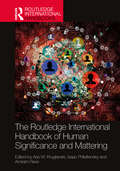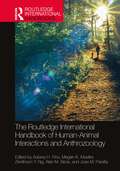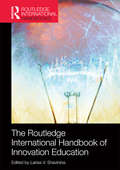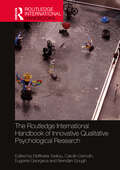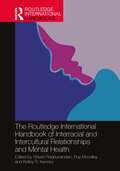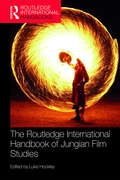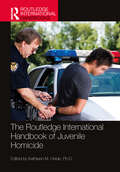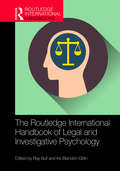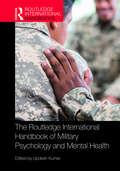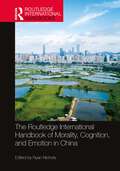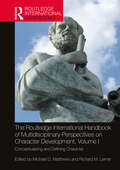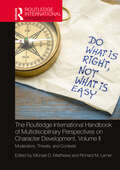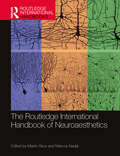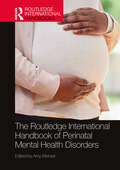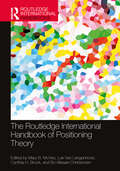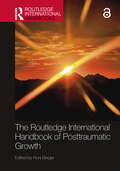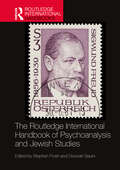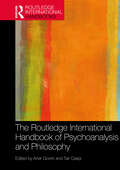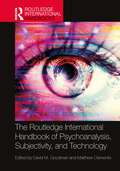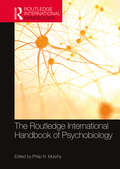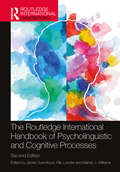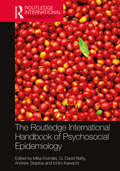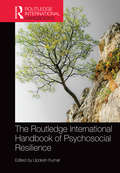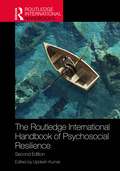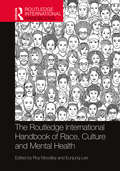- Table View
- List View
The Routledge International Handbook of Human Significance and Mattering (Routledge International Handbooks)
by Isaac Prilleltensky Arie W. Kruglanski Amiram RavivThis innovative book addresses the need for significance and mattering as a universal human motivation. It examines the impact of significance and mattering, considering how they manifest across our lifespan and in different parts of our lives.Written by a team of eminent authors with expertise in diverse psychological fields, the book explores how significance and mattering extend to almost all social domains, including families, schools, colleges, groups, workplaces, communities, and nations. The book is divided into four main parts, which consider the impact of significance and mattering across the life span, across life domains, across societies and cultures, and in mental health. The chapters outline how significance and mattering power race and gender politics, shape attitudes toward immigration, drive violent extremism, and underlie mental health issues, such as loneliness, and narcissism. The book considers the quest for significance as a fundamental motive in our personal interactions and in how society operates as a whole.Providing a truly comprehensive coverage of a ubiquitous psychological dynamic that affects all aspects of our lives, this book will be highly relevant for researchers, academics, practitioners, and students in psychology, social sciences, education, social work, and therapeutic professions. In addition, the book should appeal to organizational, political, and community leaders and the general public interested in human behavior and social problems.
The Routledge International Handbook of Human-Animal Interactions and Anthrozoology (Routledge International Handbooks)
by Aubrey H. Fine Alan M. Beck Jose M. Peralta Megan K. Mueller Zenithson Y. NgThis diverse, global, and interdisciplinary volume explores the existing research, practice, and ethical issues pertinent to the field of human-animal interactions (HAIs), interventions, and anthrozoology, focusing on the perceived physical and mental health benefits to humans and the challenges derived from these relationships. The book begins by exploring the basic theoretical principles of anthrozoology and HAI, such as the evolution and history of the field, the importance of language, the economic costs and current perspectives to physical and mental wellbeing, the origins of domestication of animals, anthropomorphism, and how animals fit into human societies. Chapters then move onto practice, covering topics such as how animals help childhood and adulthood development, pet ownership, disability, the roles of pets for people with psychiatric disorders, the links between animal and domestic abuse, and then more widely into the therapeutic roles of animals, animal-assisted therapies, interactions outside the home, working animals, animals in popular culture, and animals in research, for leisure, and food. Including chapters on a wide range of animals, from domesticated pets to wildlife, this collection examines the benefits yet also reveals the complexity, and often dark side, of human-animal relations. Interweaving accessible commentaries with revealing chapters throughout the text, this collection would be of great interest to students and practitioners in the fields of mental health, psychology, veterinary medicine, zoology, biology, social work, history, and sociology.
The Routledge International Handbook of Innovation Education (Routledge International Handbooks Of Education Ser.)
by Larisa V. ShavininaThe Routledge International Handbook of Innovation Education is the international reference work on innovation education and potentially opens an entirely new direction in education. The overall goal of the handbook is to address the question of how to develop innovators in general and how to develop the innovative potential of today‘s young people
The Routledge International Handbook of Innovative Qualitative Psychological Research (Routledge International Handbooks)
by Brendan Gough Carolin Demuth Eleftheria Tseliou Eugenie GeorgacaThe contemporary world currently faces multi-level challenges, including cross-border migration, economic crises and myriad health issues, including the recent COVID-19 pandemic. Within this wider context of ongoing fluidity, transition and diversity, qualitative research methodologies in psychology are rapidly evolving, featuring innovative ways to examine the dynamic interrelation of societal and psychological processes. The Routledge International Handbook of Innovative Qualitative Psychological Research sets the stage for cutting-edge debates on how innovative approaches in qualitative research in psychology can contribute to tackling current challenges in our society. The handbook depicts innovation in qualitative research in psychology with respect to methodological approaches like visual methods, arts-based research, discursive and narrative approaches, multimodal approaches, and pluralistic/mixed methodology approaches. It addresses a wide range of contemporary, challenging topics at the intersection of the psychological with the societal sphere, like globalization, climate change, digitalization, urbanization, social marginalization, gender and sexism, youth cultures, global mobility and global health risks. The book also includes contributions from various European countries across different fields of psychology, like clinical, health, social, educational, environmental, developmental, organizational, political and media psychology. This is a valuable text for anyone teaching qualitative research courses in psychology as well as in related disciplines like mental health, education and sociology. It will also be of great interest to any qualitative researcher in the behavioral and social sciences wishing to have an overview of the latest developments in the field.
The Routledge International Handbook of Interracial and Intercultural Relationships and Mental Health (Routledge International Handbooks)
by Roy Moodley Shivon Raghunandan Kelley R. KenneyThe Routledge International Handbook of Interracial and Intercultural Relationships and Mental Health presents critical, theoretical, empirical, and psychological accounts of intercultural intimacies.It challenges pervasive Eurocentric discourse and ideas and offers current, scholarly, practical, equitable, global, and intercultural responsive philosophies, theories, clinical frameworks, and practices. The chapters in this text offer critical perspectives on the mental health and well‑being of intercultural couples, inclusive of multi‑cultural, multi‑ethnic, multi‑faith, multi‑sexual, multi‑racial, multi‑gendered, multi‑abled couples, and their intersections. A diverse range of international contributors present an intersectional analysis of traditional and contemporary cultural ideas and relationship philosophies and explore multiple global and cultural psychologies that shape the health and well‑being of intercultural couples and their families.This handbook is essential for students, educators, mental health clinicians, and researchers in counselling, psychotherapy, clinical psychology, psychiatry, and social work programmes.
The Routledge International Handbook of Jungian Film Studies (Routledge International Handbooks)
by Luke HockleyThe Routledge International Handbook of Jungian Film Studies weaves together the various strands of Jungian film theory, revealing a coherent theoretical position underpinning this exciting recent area of research, while also exploring and suggesting new directions for further study. The book maps the current state of debates within Jungian orientated film studies and sets them within a more expansive academic landscape. Taken as a whole, the collection shows how different Jungian approaches can inform and interact with a broad range of disciplines, including literature, digital media studies, clinical debates and concerns. The book also explores the life of film outside cinema - what is sometimes termed ‘post-cinema’ - offering a series of articles exploring Jungian approaches to cinema and social media, computer games, mobile screens, and on-line communities. The Routledge International Handbook of Jungian Film Studies represents an essential resource for students and researchers interested in Jungian approaches to film. It will also appeal to those interested in film theory more widely, and in the application of Jung’s ideas to contemporary and popular culture.
The Routledge International Handbook of Juvenile Homicide (Routledge International Handbooks)
by Kathleen M. HeideThe Routledge International Handbook of Juvenile Homicide is the definitive work on juvenile homicide. This volume provides an up-to-date, comprehensive, and in-depth exploration of what is known about juveniles involved in murder. Taking an interdisciplinary approach to juvenile homicide, this handbook brings together the leading experts in social sciences, mental health, and law from many countries. The volume covers the phenomenon of juvenile homicide from beginning to end, by addressing the questions “why do kids kill?” all the way to “how does society stop them from killing?”. The tough issues involved in sentencing youths who take the lives of others, often deliberately and in horrific ways, are confronted through chapters addressing the legal issues, child development factors, risk assessment, public attitudes, and ethical concerns. The volume brings together research specifically conducted for this volume, in addition to summaries and discussions of clinical and empirical findings. Each chapter ends with key takeaway points. Contributors include psychologists, psychiatrists, criminologists, sociologists, lawyers, economists, biologists, epidemiologists, and public health and public policy experts. Uniquely, they examine murder by juveniles across the globe. The volume includes research pertaining to the causes, correlates, and theoretical explanations of juvenile homicide offending. Moving beyond discussions of juvenile homicide offenders (JHOs) as a homogenous group, the volume includes research on specific types of JHOs and research investigating age and gender differences among JHOs. In addition, it draws attention to the empirical factors associated with juvenile homicide offending, effective treatment of JHOs, recidivism, and prevention of violent behavior. The volume also makes recommendations for policy and practice, including how to shift government policy from punishing lawbreakers to saving lives. This volume is essential reading for scholars and students researching youth violence/juvenile homicide across a variety of disciplines including criminology, criminal justice, law, psychology, psychiatry, sociology, social work, public health, and education. It is also an invaluable reference for mental health professionals, practitioners in the juvenile and criminal justice systems, policymakers, and government leaders.
The Routledge International Handbook of Legal and Investigative Psychology (Routledge International Handbooks)
by Ray Bull Iris Blandón-GitlinThe Routledge International Handbook of Legal and Investigative Psychology explores contemporary topics in psychological science, applying them to investigative and legal procedures. Written by recognized scholars from around the globe, this book brings together current research, emerging trends, and cutting-edge debates in a single comprehensive and authoritative volume. Drawing from both research and practice, this handbook highlights many important issues such as: how to investigate and prosecute rape; the value of emotional affect in homicide investigations; and factors affecting jurors’ and suspects’ decision making. By considering current research, the authors inform both legal and investigative professionals of findings that are of direct relevance to them, and the steps that can be taken to improve efficiency. This collection will inform investigative and legal professionals, advanced psychology students, academics, researchers, and policy makers. It will also be of great interest to researchers from other disciplines, including criminology, policing, and law.
The Routledge International Handbook of Military Psychology and Mental Health (Routledge International Handbooks)
by Updesh KumarMilitary psychology has become one of the world’s fastest-growing disciplines with ever-emerging new applications of research and development. The Routledge International Handbook of Military Psychology and Mental Health is a compendium of chapters by internationally renowned scholars in the field, bringing forth the state of the art in the theory, practice and future prospects of military psychology. This uniquely interdisciplinary volume deliberates upon the current issues and applications of military psychology not only within the military organization and the discipline of psychology, but also in the larger context of its role of building a better world. Split into three parts dedicated to specific themes, the first part of the book, "Military Psychology: The Roots and the Journey," provides an overview of the evolution of the discipline over the years, delving into concepts as varied as culture and cognition in the military, a perspective on the role of military psychology in future warfare and ethical issues. The second part, "Soldiering: Deployment and Beyond," considers the complexities involved in soldiering in view of the changing nature of warfare, generating a focal discourse on various aspects of military leadership, soldier resilience and post-traumatic growth in the face of extreme situations, bravery and character strengths and transitioning to civilian life. In the final section, "Making a Choice: Mental Health Issues and Prospects in the Military," the contributors focus on the challenges and practices involved in maintaining the mental health of the soldier, covering issues ranging from stress, mental health and well-being, through to suicide risk and its prevention, intervention and management strategies, moral injury and post-traumatic stress disorder. Incorporating enlightening contributions of eminent scholars from around the world, the volume is a comprehensive repository of current perspectives and future directions in the domain of military psychology. It will prove a valuable resource for mental health practitioners, military leaders, policy-makers and academics and students across a range of disciplines.
The Routledge International Handbook of Morality, Cognition, and Emotion in China (Routledge International Handbooks)
by Ryan NicholsThis ground-breaking handbook provides multi-disciplinary insight into Chinese morality, cognition and emotion by collecting in one place a comprehensive collection of essays focused on Chinese morality by world-leading experts from more than a dozen different academic fields of study. Through fifteen substantive chapters, readers are offered a holistic look into the ways morality could be interpreted in China, and a broad range of theoretical perspectives, including ecological, anthropological and cultural neuroscience. Offering a syncretic, multi-disciplinary overview that moves beyond the usual western-oriented perspective of China as a monolithic culture, research questions addressed in this book focus on morality as represented at the level of the individual, rather than at the group or institutional levels. Research questions explored herein include: What are the major contours of distinctively Chinese morality? What was the role of the ancient ecology, climate, and pathogen load in producing Chinese moral attitudes and emotions? Are ingredients of the good life in China different than ingredients of the good life elsewhere? How are children in China morally educated? How do findings from cultural neuroscience help us understand differences in the treatment of family members, or the treatment of strangers, in China and elsewhere? How do the protests in Hong Kong participate in, or stand apart from, the ongoing ethics of protest in historical China? The clear structure and accessible writing offer a rigorous assessment of the ways in which morality can be interpreted, shedding light on differences between China and Western cultures. The book also provides a timely window into Chinese forms of morality, and the pivotal role these play in social organization, family relationships, systems of government, emotion and cognition. Representing fields of study ranging from philosophy, linguistics, archaeology, history, and religion, to social psychology, neuroscience, clinical psychology, developmental psychology, and behavioral ecology, this is an essential text for students, academics, and others with wide interest in Chinese culture.
The Routledge International Handbook of Multidisciplinary Perspectives on Character Development, Volume I: Conceptualizing and Defining Character (Routledge International Handbooks)
by Richard M. Lerner Michael D. MatthewsDrawing from philosophy, religion, biology, behavioral and social sciences, and the arts, The Routledge International Handbooks of Multidisciplinary Perspectives on Character Development, Volumes I and II, present cutting-edge scholarship about the concept of character across the life span, the developmental and contextual bases of character, and the key organizations of societal sectors, within and across nations, that promote character development in individuals, families, and communities.This first volume, Conceptualizing and Defining Character, explores the foundations of the field by providing an array of interdisciplinary approaches to character development, including economics, education, law, literature, military science, philosophy, and many more. With contributions from international experts, Volume I brings together cutting-edge research and discusses instances of character development, including civic character, courage, fairness, forgiveness, gratitude, morality, tolerance, and thankfulness.This comprehensive publication is an essential reference for researchers and graduate students in behavioral sciences, biology, philosophy, theology, and economics, as well as practitioners leading or evaluating character education or character development programs around the world.Find Volume II: Moderators, Threats, and Contexts here: www.routledge.com/9781032172453
The Routledge International Handbook of Multidisciplinary Perspectives on Character Development, Volume II: Moderators, Threats, and Contexts (Routledge International Handbooks)
by Richard M. Lerner Michael D. MatthewsDrawing from philosophy, religion, biology, behavioral and social sciences, and the arts, The Routledge International Handbooks of Multidisciplinary Perspectives on Character Development, Volumes I and II, present cutting-edge scholarship about the concept of character across the life span, the developmental and contextual bases of character, and the key organizations of societal sectors, within and across nations, that promote character development in individuals, families, and communities.This second volume, Moderators, Threats, and Contexts, focuses on the moderators and covariates of character development with chapters pertaining to cultural- and contextual-based exemplars of character development; grit, achievement, and resilience; hope for the future; and parenting and self-regulation. With contributions from international experts, Volume II goes on to discuss threats to moral, positive, or virtuous character development, as well as the different contexts wherein the character is studied and promoted. Special attention is paid to the centers of excellence at universities around the world that specialize in character development research and character education.This comprehensive publication is an essential reference for researchers and graduate students in behavioral sciences, biology, philosophy, theology, and economics, as well as practitioners leading or evaluating character education or character development programs around the world.Find Volume I: Conceptualizing and Defining Character here: www.routledge.com/9781032169491
The Routledge International Handbook of Neuroaesthetics (Routledge International Handbooks)
by Martin Skov Marcos NadalThe Routledge International Handbook of Neuroaesthetics is an authoritative reference work that provides the reader with a wide-ranging introduction to this exciting new scientific discipline. The book brings together leading international academics to offer a well-balanced overview of this burgeoning field while addressing two questions central to the field: how the brain computes aesthetic appreciation for sensory objects and how art is created and experienced. The editors, Martin Skov and Marcos Nadal, have compiled a neuroscientific, physiological, and psychological overview of the systems underlying the evaluation of sensory objects and aesthetic appreciation. Covering a variety of art forms mediated by vision, audition, movement, and language, the handbook puts forward a critical review of the current research to explain how and why perceptual and emotional processes are essential for art production. The work also unravels the interaction of art with expectations, experience and knowledge and the modulation of artistic appreciation through social and contextual settings, eventually bringing to light the potential of art to influence mental states, health, and well-being. The concepts are presented through research on the neural processes enabling artistic creativity, artistic expertise, and the evolution of symbolic cognition. This handbook is a compelling read for anyone interested in making a first venture into this exciting new area of study and is best suited for students and researchers in the fields of neuroaesthetics, perceptual learning, and cognitive psychology.
The Routledge International Handbook of Perinatal Mental Health Disorders (Routledge International Handbooks)
by Amy WenzelThe Routledge International Handbook of Perinatal Mental Health Disorders comprehensively presents the leading, global research in understanding and clinically treating perinatal mental health disorders.In this wide-ranging book, Wenzel invites a global community of scholars and practitioners working in perinatal mental health to discuss contemporary empirical research in the field and how this can be applied in practice. Presented in five parts, the book begins by laying out the historical context of the field before exploring prenatal and postpartum mental health disorders, such as depression, anxiety, alcohol and drug misuse, eating disorders, and insomnia. Chapters describe different interventions, such as mindfulness-based interventions, integrative interpersonal psychotherapy, and cognitive behavioral therapy, before addressing specific special issues, such as fathers’ experiences, 2SLGBTQ+ individuals, and perinatal mental health disorders in migrant women. Designed to have international relevance, each chapter includes case studies and sections on cultural considerations, and clinical dialogue is used throughout to illustrate specific applications of contemporary empirical research to clinical practice.This handbook is essential reading for clinicians who have an interest in issues associated with perinatal mental health disorders, as well as students of clinical social work, clinical psychiatry, clinical psychology, obstetrics and gynecology, nursing, and midwifery.
The Routledge International Handbook of Positioning Theory (Routledge International Handbooks)
by Luk Van Langenhove Cynthia H. Brock Mary B. McVee Bo Allesøe ChristensenThis handbook is the first of its kind to explore Positioning Theory. Taking inspiration from the groundwork set by Rom Harré and collaborators such as Bronwyn Davies, Fathali Moghaddam, Luk Van Langenhove, and others the book explores the emergence, historical context, and disciplinary applications of Positioning Theory and its basic precepts as a social psychological theory.This volume encompasses over 20 chapters across four sections, assimilating cross-disciplinary insights that try to understand the theoretical underpinnings, methodological applications, and contemporary relevance of Positioning Theory. Part 1 explores the movement of scholarly figures and their numerous works on the subject. It discusses the foundational origins and the historical contexts of the existing theories on positioning and new directions for scholarship. Part 2 examines the methodological and narrative investigations used for data analysis in positioning research, navigating through the epistemological orientations and theoretical landscapes of Positioning Theory. Part 3 explores numerous applications across disciplines to consider the reach and influence of positioning within and across multiple disciplines. Lastly, the authors contemplate the future directions for Positioning Theory.Featuring researchers from leading research institutions from across the globe, the book is important reading for scholars interested in positioning and Positioning Theory. We recommend this handbook for graduate-level courses in social psychology, communication, discourse studies and related disciplines.
The Routledge International Handbook of Posttraumatic Growth (Routledge International Handbooks)
by Roni BergerThe Routledge International Handbook of Posttraumatic Growth offers a rich covering of approaches to different traumatic and stressful experiences in relation to posttraumatic growth (PTG). This handbook explores the benefits that individuals, couples, families, organizations, and communities can experience following the struggle with highly stressful and potentially traumatic events. Split into seven parts and written by a diverse international team of multidisciplinary contributors who provide a comprehensive overview of PTG, topics include religious and spiritual aspects of PTG, gender in PTG, PTG in LGBTQ+, perinatal bereavement, and more. The Routledge International Handbook of Posttraumatic Growth represents an essential resource for students, researchers, and professionals, including social workers, psychologists, nurses, mental health counselors, and psychiatrists. Chapter 1 of this book is freely available as a downloadable Open Access PDF at http://www.taylorfrancis.com under a Creative Commons [Attribution-Non Commercial-No Derivatives (CC-BY-NC-ND)] 4.0 license
The Routledge International Handbook of Psychoanalysis and Jewish Studies (Routledge International Handbooks)
by Frosh StephenThe Routledge International Handbook of Psychoanalysis and Jewish Studies is an innovative, multidisciplinary volume covering the history, religion, culture and politics of Jewish Studies and psychoanalysis.An international team of contributors brings together these two fields and offers a critical assessment of the encounters that emerge from the confrontation and collaboration they have with each other. Chapters cover a broad range of topics, including psychoanalytic history, critical theory, film, ritual, Jewish heritage, the Bible, antisemitism, racism, life- writing and the occult.This Handbook will be of interest to practitioners and researchers in several interrelated disciplines, such as Jewish Studies, psychoanalysis, group analysis, sociology, anthropology, psychosocial studies, literature, film and gender studies. It will be of especial value to students of psychoanalytic and psychosocial studies.
The Routledge International Handbook of Psychoanalysis and Philosophy (Routledge International Handbooks)
by Aner Govrin Tair CaspiThe Routledge International Handbook of Psychoanalysis and Philosophy provides a rich panoramic view of what philosophy offers or disturbs in psychoanalysis and what it represents for psychoanalytic theory and practice. The thirty-three chapters present a broad range of interfaces and reciprocities between various aspects of psychoanalysis and philosophy. It demonstrates the vital connection between the two disciplines: psychoanalysis cannot make any practical sense if it is not entirely perceived within a philosophical context. Written by a team of world-leading experts, including established scholars, psychoanalysts and emerging talents, the Handbook investigates and discusses the psychoanalytic schools and their philosophical underpinning, as well as contemporary applied topics. Organized into five sections, this volume investigates and discusses how psychoanalysis stands in relation to leading philosophies such as Wittgenstein, Heidegger, Nietzsche, and Kant; philosophical perspectives on psychoanalytic schools such as Freud, Klein, Bion, Kohut, and Lacan; how psychoanalysis addresses controversial topics in philosophy such as truth, language and symbolism, ethics, and theories of mind. The last section addresses contemporary applied subjects in psychoanalytic thought: colonialism, gender, race, and ecology. This Handbook offers a novel and comprehensive outlook vital for scholars, philosophers, practicing psychoanalysts and therapists alike. The book will serve as a source for courses in psychoanalysis, philosophy of science, epistemology, ethics, semiotics, cognitive science, consciousness, gender, race, post-colonialism theories, clinical theory, Freud's studies, both in universities and psychoanalytic training programs and institutes.
The Routledge International Handbook of Psychoanalysis, Subjectivity, and Technology (Routledge International Handbooks)
by David M. GoodmanThe Routledge International Handbook of Psychoanalysis, Subjectivity, and Technology uniquely provides a comprehensive overview of human subjectivity in the technological age and how psychoanalysis can help us better understand human life. Presented in five parts, David M. Goodman and Matthew Clemente collaborate with an international community of scholars and practitioners to consider how psychoanalytic formulations can be brought to bear on the impact technology has had on the facets of human subjectivity. Chapters examine how technology is reshaping our understanding of what it means to be a human subject, through embodiment, intimacy, porn, political motivation, mortality, communication, interpersonal exchange, thought, attention, responsibility, vulnerability, and more. Filled with thought-provoking and nuanced chapters, the contributors approach technology from a diverse range of entry points but all engage through the lens of psychoanalytic theory, practice, and thought. This book is essential for academics and students of psychoanalysis, philosophy, ethics, media, liberal arts, social work, and bioethics. With the inclusion of timely chapters on the coronavirus pandemic and teletherapy, psychoanalysts in practice and training as well as other mental health practitioners will also find this book an invaluable resource.
The Routledge International Handbook of Psychobiology (Routledge International Handbooks)
by Philip N. MurphyThe Routledge International Handbook of Psychobiology provides authoritative, cutting-edge research across the range of areas that fall under the umbrella of psychobiology. The handbook comprises 30 chapters which are organized into seven sections: the physical environment; how psychobiological processes regulate how we respond and cope; stress and anxiety; managing and enhancing mood and cognition; substance use and misuse; sleep; and psychobiology and human development. Each of the chapters is authored by experienced and active researchers in their field who provide authoritative reviews of the latest developments in psychobiology. It is essential reading for both established researchers in the field of psychobiology, as well as advanced students wishing to learn more about both the historical foundations and latest developments in this rapidly growing field.
The Routledge International Handbook of Psycholinguistic and Cognitive Processes (Routledge International Handbooks)
by Jackie Guendouzi, Filip Loncke and Mandy J. WilliamsThis handbook provides a comprehensive overview of the theories of cognition and language processing relevant to the field of communication disorders. Thoroughly updated in its second edition, the book explores a range of topics and issues that illustrate the relevance of a dynamic interaction between both theoretical and applied clinical work. Beginning with the origins of language evolution, the authors explore a range of both developmental and acquired communication disorders, reflecting the variety and complexity of psycholinguistics and its role in extending our knowledge of communication disorders. The first section outlines some of the major theoretical approaches from psycholinguistics and cognitive neuroscience that have been influential in research focusing on clinical populations, while Section II features examples from researchers who have applied this body of knowledge to developmental disorders of communication. Section III features examples focusing on acquired language disorders, and finally, Section IV considers psycholinguistic approaches to gesture, sign language, and alternative and augmentative communication (AAC). The new edition features new chapters offering fresh perspectives, further reading recommendations and a new epilogue from Jackie Guendouzi. This valuable text serves as a single interdisciplinary resource for graduate and upper-level undergraduate students in cognitive neurosciences, psychology, communication sciences and disorders, as well as researchers new to the field of communication disorders or to psycholinguistic theory.
The Routledge International Handbook of Psychosocial Epidemiology (Routledge International Handbooks)
by Andrew Steptoe Ichiro Kawachi Mika Kivimäki David G. BattyThe health effects of psychosocial factors are a widely discussed and controversial topic. Do positive and negative emotions affect our risk of developing physical disease? Are depressive individuals more likely to have cancer than those with an optimistic outlook on life? And what is the role of IQ in staying healthy and recovering from disease? Importantly, can we improve our health and life expectancy by avoiding certain psychosocial risk factors and maximizing positive psychological well-being? These and other questions are the focus of psychosocial epidemiology, a discipline linking psychological, social and biological sciences. <P><P>The Routledge International Handbook of Psychosocial Epidemiology is the first book to map this growing discipline. Including contributions from many of the leading researchers in the field, it is divided into five sections: <li>Part I: Methodological challenges in studying psychosocial factors and health; <li>Part II: Psychosocial factors in the etiology and prognosis of chronic diseases; <li>Part III: Controversies in the psychosocial approach; <li>Part IV: Interventions and policy implications <li>Part V: Future research directions <P><P>Taking advantage of a huge growth in research in recent years, the book provides the reader with the essentials to evaluate the diverse set of studies on psychosocial factors and health that are published today, and describes study designs in this field of research, progress in judging the validity of epidemiological evidence, as well as challenges in translating evidence into action. <P><P>This is an important and timely book. Providing methodological rigour, critical analysis and the policy implications of this emerging field of study, The Routledge International Handbook of Psychosocial Epidemiology will be an invaluable resource for students and researchers within both behavioural and medical sciences, as well as policy makers and others working in health and social care.
The Routledge International Handbook of Psychosocial Resilience (Routledge International Handbooks)
by Updesh KumarPsychological resilience has emerged as a highly significant area of research and practice in recent years, finding applications with a broad range of different groups in many settings. Contemporary discourse is not limited to ways of effective coping with adversity but also introduces mechanisms that can lead to enhanced capacity after dealing with difficult circumstances and recognises the importance of enriching the field with varied perspectives. The Routledge International Handbook of Psychosocial Resilience is a comprehensive compendium of writings of international contributors that takes stock of the state-of-the-art in resilience theory, research and practice. The Routledge International Handbook of Psychosocial Resilience covers the many different trajectories that resilience research has taken in four parts. Part One delineates the ‘Conceptual Arena’ by providing an overview of the current state of theory and research, exploring biological, psychological, and socio-ecological perspectives and discussing various theoretical models of personal and social resilience. The ‘Psychosocial Correlates’ of resilience are discussed further in Part Two, from personal and personality correlates, socio-environmental factors and the contextual and cultural conditions conducive to resilient behaviour. In Part Three, ‘Applied Evidences’ are introduced in order to build upon the theoretical foundations in the form of several case studies drawn from varied contexts. Examples of resilient behaviour range from post-disaster scenarios to special operation groups, orphaned children, and violent extremism. Finally, Part Four, ‘Proposed Implications and Resilience Building’, sums up the issues involved in discussing post-traumatic growth, wellbeing and positive adaptation in the varied contexts of personal, familial, organizational and societal resilience. The volume provides a comprehensive overview of resilience theory, practice and research across disciplines and cultures, from varied perspectives and different populations. It will be a key reference for psychiatrists, psychologists, psychotherapists and psychiatric social workers in practice and in training as well as researchers and students of psychology, sociology, human development, family studies and disaster management.
The Routledge International Handbook of Psychosocial Resilience (Routledge International Handbooks)
by Updesh KumarPsychological resilience has emerged as a highly significant area of research and practice, finding applications with a broad range of different groups in many settings. The second edition of The Routledge International Handbook of Psychosocial Resilience is a comprehensive compilation of chapters from an international team of contributors that takes stock of the state of the art in resilience theory, research, and practice.It covers the many different trajectories that resilience research has taken in four sections: the conceptual trends, psychosocial correlates, applied evidence, and cultivating resilience: impact and implications. This second edition has been thoroughly updated throughout and includes new chapters on topics such as military resilience, resilience in rural contexts, cultural pathways, digital well-being, post-traumatic growth, building resilience with conflict survivors, peer support in varying contexts of marginalization, and the role of spirituality.This handbook is essential for psychiatrists, psychologists, psychotherapists, and psychiatric social workers, as well as researchers and students of psychology, sociology, human development, family studies, and disaster management.
The Routledge International Handbook of Race, Culture and Mental Health (Routledge International Handbooks)
by Moodley, Roy / Lee, EunjungThis handbook presents a thorough examination of the intricate interplay of race, ethnicity, and culture in mental health – historical origins, subsequent transformations, and the discourses generated from past and present mental health and wellness practices. The text demonstrates how socio-cultural identities including race, gender, class, sexual orientation, disability, religion, and age intersect with clinical work in a range of settings. Case vignettes and recommendations for best practice help ground each in a clinical focus, guiding practitioners and educators to actively increase their understanding of non-Western and indigenous healing techniques, as well as their awareness of contemporary mental health theories as a product of Western culture with a particular historical and cultural perspective. The international contributors also discuss ways in which global mental health practices transcend racial, cultural, ethnic, linguistic, and political boundaries. The Routledge International Handbook of Race, Culture and Mental Health is an essential resource for students, researchers, and professionals alike as it addresses the complexity of mental health issues from a critical, global perspective.
